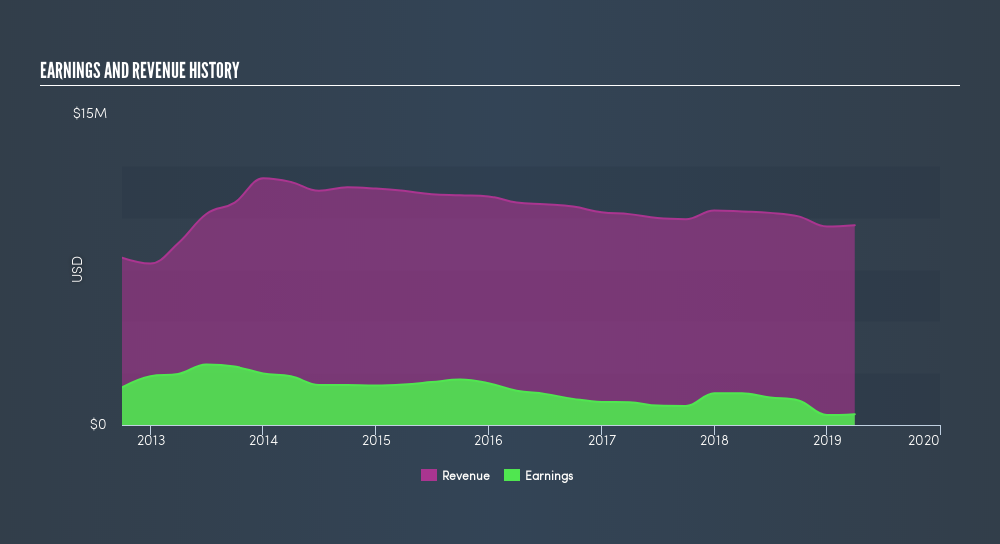- United States
- /
- Banks
- /
- NasdaqGM:KFFB
Imagine Owning Kentucky First Federal Bancorp (NASDAQ:KFFB) And Wondering If The 12% Share Price Slide Is Justified

Want to participate in a short research study? Help shape the future of investing tools and you could win a $250 gift card!
In order to justify the effort of selecting individual stocks, it's worth striving to beat the returns from a market index fund. But the main game is to find enough winners to more than offset the losers At this point some shareholders may be questioning their investment in Kentucky First Federal Bancorp (NASDAQ:KFFB), since the last five years saw the share price fall 12%.
Check out our latest analysis for Kentucky First Federal Bancorp
Given that Kentucky First Federal Bancorp only made minimal earnings in the last twelve months, we'll focus on revenue to gauge its business development. As a general rule, we think this kind of company is more comparable to loss-making stocks, since the actual profit is so low. It would be hard to believe in a more profitable future without growing revenues.
In the last five years Kentucky First Federal Bancorp saw its revenue shrink by 3.7% per year. That's not what investors generally want to see. The stock hasn't done well for shareholders in the last five years, falling 2.4%, annualized. Unfortunately, though, it makes sense given the lack of either profits or revenue growth. Without profits, its hard to see how shareholders win if the revenue keeps falling.

It's probably worth noting that the CEO is paid less than the median at similar sized companies. It's always worth keeping an eye on CEO pay, but a more important question is whether the company will grow earnings throughout the years. This free interactive report on Kentucky First Federal Bancorp's earnings, revenue and cash flow is a great place to start, if you want to investigate the stock further.
What About Dividends?
When looking at investment returns, it is important to consider the difference between total shareholder return (TSR) and share price return. The TSR incorporates the value of any spin-offs or discounted capital raisings, along with any dividends, based on the assumption that the dividends are reinvested. It's fair to say that the TSR gives a more complete picture for stocks that pay a dividend. We note that for Kentucky First Federal Bancorp the TSR over the last 5 years was 12%, which is better than the share price return mentioned above. And there's no prize for guessing that the dividend payments largely explain the divergence!
A Different Perspective
While the broader market gained around 7.1% in the last year, Kentucky First Federal Bancorp shareholders lost 2.6% (even including dividends). However, keep in mind that even the best stocks will sometimes underperform the market over a twelve month period. Longer term investors wouldn't be so upset, since they would have made 2.2%, each year, over five years. If the fundamental data continues to indicate long term sustainable growth, the current sell-off could be an opportunity worth considering. Importantly, we haven't analysed Kentucky First Federal Bancorp's dividend history. This free visual report on its dividends is a must-read if you're thinking of buying.
But note: Kentucky First Federal Bancorp may not be the best stock to buy. So take a peek at this free list of interesting companies with past earnings growth (and further growth forecast).
Please note, the market returns quoted in this article reflect the market weighted average returns of stocks that currently trade on US exchanges.
We aim to bring you long-term focused research analysis driven by fundamental data. Note that our analysis may not factor in the latest price-sensitive company announcements or qualitative material.
If you spot an error that warrants correction, please contact the editor at editorial-team@simplywallst.com. This article by Simply Wall St is general in nature. It does not constitute a recommendation to buy or sell any stock, and does not take account of your objectives, or your financial situation. Simply Wall St has no position in the stocks mentioned. Thank you for reading.
About NasdaqGM:KFFB
Kentucky First Federal Bancorp
Operates as the holding company for First Federal Savings and Loan Association of Hazard, Kentucky, and Frankfort First Bancorp, Inc.
Excellent balance sheet and slightly overvalued.
Similar Companies
Market Insights
Community Narratives


